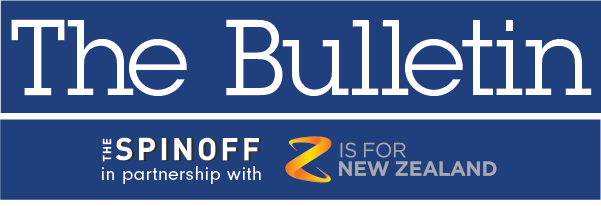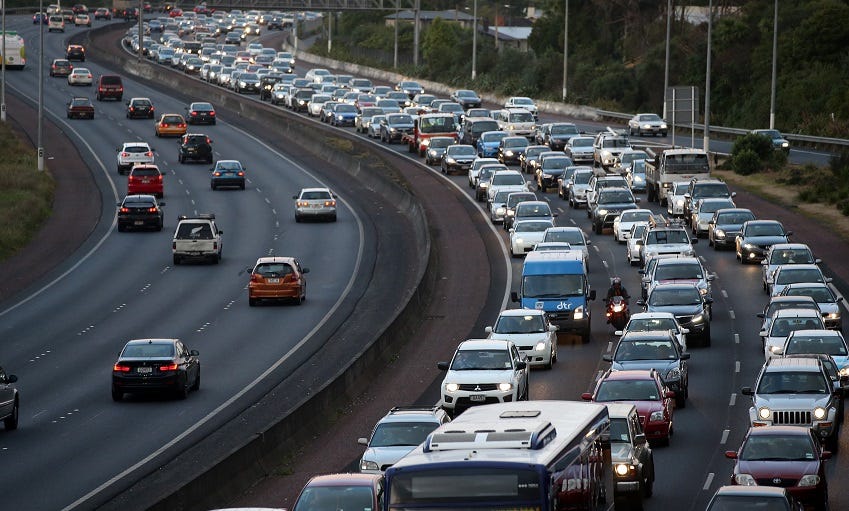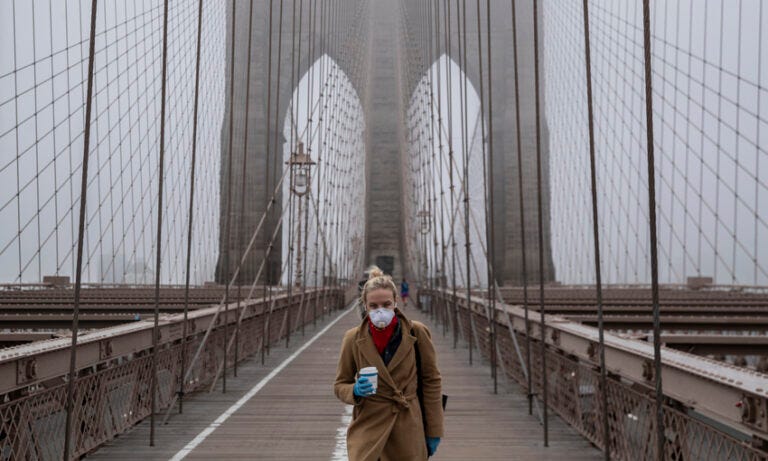Will the Covid-19 recovery be green?
These discussions need to happen now, or they'll be too late to make a difference.

Good morning and welcome to The Bulletin for Tuesday 14 April, by Alex Braae for The Spinoff. Presented in partnership with Z Energy.
In today’s edition: Questions over how environmentally friendly Covid-19 recovery will be, consistent daily updates of new cases, and repatriation flights from India organised.

Image: Thousands of Auckland commuters demonstrating physical distancing (Getty Images)
There has been an increasing amount of commentary about the state of the environment during and after the pandemic. Air quality in cities has improved dramatically, carbon emissions are way down, birds are having a much better time of it, and rubbish volumes are likely to fall over the coming months. But before anyone gets carried away with excitement, these aren't necessarily causes for celebration, because of the massive economic dislocation and insecurity that has accompanied the changes.
It's for these sorts of reasons that climate change minister James Shaw is not celebrating the emissions cuts in the slightest. In an interview with Q+A over the weekend, he described Covid-19 as a "terrible" outcome for the environment, because it will put pressure on money needed for emissions measures, and because attention will be taken away from fighting climate change at a crucial moment for the world. "The great risk is we take our eye off the ball of the long term while we’re dealing with the short term challenge."
There was an example of that in last week's Bulletin, which linked to the NZ Herald's story on Auckland Council deliberations about future infrastructure projects – one councillor using the word "boutique" to describe the importance they placed on climate change in those discussions. It might matter hugely to the liveability of the planet over the next 100 years, but that's a more difficult case to make when confronted with immediate problems like pandemics and mass unemployment. This will be particularly relevant in infrastructure development decisions, with the rapid rollout of projects being seen as a key part of the recovery. As environmental planning professor Iain White writes on The Spinoff this morning, the nature of 'shovel-ready' infrastructure projects is that they reveal both the measurement systems and priorities of the past, and not necessarily the future. "In New Zealand we can easily provide evidence on roads or pipes, while things like wellbeing, the arts, cycling, or the future impacts of climate change are more intangible," writes White. It's a very thoughtful piece, and I encourage you to read it.
There's also the risk that measures taken to fight Covid-19 will cut against the sort of societal and behavioural changes needed to fight climate change. Take public transport, for example. Auckland was making great progress up until this year in getting people onto buses and trains, rather than using their own cars. But many of those buses at rush hour were so jammed full of people that at some stops they couldn't pick any more up – it goes without saying how incongruous that would be in a world of physical distancing.
At the same time, we're coming up to a series of monumental decisions on climate change that will shape New Zealand's response for decades. Eloise Gibson at Stuff has written about the Climate Change Commission, who are tasked with setting emissions budgets. It was already going to be a horribly complicated process, but now will be much more so. To put in context how these sorts of complications play out, look at the oil price – with incredibly weak global demand right now, it has crashed, which also means that the business case for alternative and renewable energy has weakened.
Will there be opportunities in recovery? Perhaps, and there's certainly no harm in talking about them. Writing on Newsroom, Xero founder Rod Drury argued that it was the perfect time to be talking about how to make the economy greener. One example he talked about – which might be a bit fanciful, but let's dream – was that New Zealand should make itself a world leader in electric aviation, because the overwhelming majority of air travel here is short-haul. And writing on Stuff, James Every-Palmer QC argues that there is a moral responsibility to use the massive amounts of money being borrowed by the government right now to prioritise climate-friendly projects, because it is the young people of today who will spend their taxpaying years footing the bill.
If you're a new reader of The Spinoff, you might still be confused about who or what we are. Welcome, it's great to have you here, and to explain how we operate, managing editor Duncan Greive has written this explainer. And if you've been making a contribution in the form of Spinoff Members, we're very grateful for it, and will be using those contributions to produce more high quality writing and journalism.
Each day of the Easter weekend saw new Covid-19 cases being announced, with none of the updates suggesting it was getting out of control. Sadly, there have been several more deaths, bringing the total toll to five so far. The latest numbers have been charted here, with 1349 cases in total, and 546 recoveries to date. Other news updates from Monday and the weekend can be found here, and we've transcribed a series of questions and answers from the public to Dr Ashley Bloomfield.
Repatriation flights are continuing for New Zealanders overseas. Radio NZ has reported on the latest efforts to get people home from India, with the government strongly encouraging those there to take them up now, on the grounds that it is totally unknown when commercial international flights will return. On the other side of the world, a flight out of Peru is expected to leave this morning, with dozens of New Zealanders on board.
It could easily be overtaken by events, but right now schools are scheduled to reopen for some students on April 29. The NZ Herald's Simon Collins has reported on the announcement, with a lot of potential scenarios still being worked through – such as only the children of essential workers coming to class, or only teachers coming in to provide distance learning while using the school's broadband network. Regional reopening is also a possibility, and would likely depend on whether regional alert levels are put in place later this month – a decision on extending the lockdown will be announced on April 20. Even if the April 29 date is met, it is still going to be a very long time before normal school life continues for teachers, parents and students.
A police chase over the weekend has resulted in several serious injuries. While chases happen regularly, you might have thought that they'd be abandoned during the lockdown, because of the very high risks associated with the policing tactic. Not so, as the police told the NZ Herald – "if these people were complying with the conditions of the coronavirus lockdown, this would not have happened," said Inspector Daniel Meade.
There has been a lot of conjecture over the weekend about whether or not the Christchurch mosque shooter visited Al-Noor before the attacks. Newshub's Patrick Gower reports on testimony from survivors, who say he joined them several times before March 15 – potentially to learn the layout of the mosque. However, this Stuff story takes a very different angle, with the police saying there was no evidence at all he had been inside the mosque before March 15. The reason this is only coming out now is that there were previously fears that these reports could jeopardise the trial process. A note on the content of these stories – the Newshub one in particular goes into some detail about the timeline of the attack, so please be advised that it will be distressing.
Got some feedback about The Bulletin, or anything in the news?
Drop us a line at thebulletin@thespinoff.co.nz

As you might imagine after a long weekend, there's a lot of good stuff to read on The Spinoff right now: We'll start with three pieces about the experience people are having outside NZ. Tess McClure has written a haunting piece about life in New York, the epicentre of the virus in the US. Dr Nic Harper writes about the dire situation in hospital wards in the UK, and how it is getting worse. Shanghai resident Asen Velinov writes about the wildly dramatic but catchy anti-Covid slogans being used in China – such as "Take a walk today and grass will soon cover your grave.”
And in NZ related pieces: Richard Simpson outlines how Civil Defence and other organisations prepare for a pandemic before they happen. ICU specialist David Galler writes about a refusal to go back to the bad old normal of the stretched and strained health system. Michael Andrew lauds the juggling skills of freelancers, which many people are finding they need to adapt too. At the same time, Matt Bartlett writes against the cult of productivity, and people feeling like they need to use the lockdown in the best possible way. David Brain covers exclusive new polling data which shows an increasingly positive view of how the government is handling the pandemic. And Andrew Todd has been in a quarantine hotel for the last two weeks – he's described his journey from Canada and experience in quarantine in vivid detail.
For a feature today, an outstanding piece of writing about what it has been like to cover Covid-19. Stuff's Henry Cooke has a real gift for showing what it's like to create the news, and this essay from over the weekend does that beautifully. Here's an excerpt:
I used to think that Chinese curse - "may you live in interesting times" - didn't apply to journalists. Interesting times are what we are built for. Then March 15 happened. Now this. There still is a sort of morbid exhilaration you get, sitting in the room as the Prime Minister announces a quasi-police state, a childlike awe for the power of the state once things really get bad. But you stop being able to turn off. I get home and just try to catch up on all the news I missed while I was writing it.
As with March 15, I find filtering the horrible events through the filter of a news story that I am writing the best way to numb myself to their power. If you have to sit back and think about the world shutting all its borders for years to come, of a recession deeper than any we've felt in a century, of needless deaths if we don't resist all the things that make us feel alive, then it all gets a bit much. When you get to write it out as a news story its just data to feed into a well-worn formula, a coping mechanism that also happens to be your job.
At this stage, the NRL is scheduled to come back at around the end of May. As Radio NZ reports, there has been some heavy political intervention in the proposal to restart it, in the form of the NSW police commissioner writing a letter stating that provided a wide range of conditions were met, there was nothing to stop it happening. A lot of logistics of the competition are yet to be worked out, and games will be played behind closed doors for the foreseeable future. But just being able to get games on TV would be a huge boost for any sport that manages to get there first, and they'd likely get immense viewer numbers.
That's it for The Bulletin. If you want to support the work we do at The Spinoff, please check out our membership programme. Have a wonderful few days, see you again on Tuesday.




